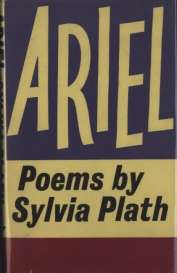Ariel

This is the light of the mind, cold and planetary.
The trees of the mind are black. The light is blue.—"The Moon and the Yew Tree"
Ariel is a collection of poetry by Sylvia Plath. Published posthumously, it's her most well known work (well, that or The Bell Jar), and her most critically acclaimed. Ariel is generally regarded to be one of the most important books of poetry of the twentieth century.
Ariel was originally published in 1965, two years after Plath died, by her husband Ted Hughes. However, the contents of this edition weren't exactly what Plath wrote the contents were to be, and another version (called "The Restored Edition") was published in 2004, with Plath's original table of contents.
Not to be mistaken for the Shakespeare character, the Disney Princess, the Lawrence Block novel, or the songs by Dean Friedman and October Project.
- Audio Adaptation: Sylvia Plath read several of the poems from Ariel on a radio show for the BBC in 1952, including "Lady Lazarus," "Daddy," "Fever 103," "Ariel," "The Applicant," and "A Birthday Present." You can still find them, too - in a collection the Beeb did, or online (if you know where to look.)
- Author Existence Failure: Pretty soon after she finished, which is why there's two versions with two different tables of contents.
- Creator Breakdown: Near the end of the writing process ("Edge" was written a couple of days before Plath committed suicide).
- Dr. Seuss: Some poems, "Daddy" in particular, have a kind of Seussian rhyme thing going on. To illustrate, check out the opening stanza of "Daddy" :
You do not do you do not do
Any more, black shoe
In which I have lived like a foot
For thirty years, poor and white,
Barely daring to breathe or achoo.
- Foreign Language Title: "Berck-Plage," "Purdah."
- Gratuitous German: Lots, but most notable in "Daddy" and "Berck-Plage"
- The Grotesque: The narrator of "Lady Lazarus" describes herself as a sideshow freak.
- Literary Allusion Title: "Ariel," "Lady Lazarus," "Nick and the Candlestick," "Gulliver," "Mary's Song."
- Magnum Opus: Ariel as a whole, but probably more specifically "Lady Lazarus," "Daddy," and "Fever 103."
- The Mistress: The other woman in "The Rival."
- Parental Abandonment: The father of the narrator of "Daddy" (and Sylvia Plath's own father) died when she was young, resulting in the narrator feeling abandoned.
- Oedipus Complex: The poem "Daddy" is from the perspective of a woman with an Electra Complex.
- Signature Style: It's not until Ariel that Sylvia Plath really developed hers.
- Some Anvils Need to Be Dropped: The introduction to the 2004 edition, written by Frieda Hughes (Sylvia Plath's daughter) is a long criticism of how people tend to revere and objectify her mother, and villify her father, to the point of losing perspective on who they really are.
- Stay in the Kitchen: The narrator of "Lesbos" is definitely getting this vibe from her husband and friends.
- Taken for Granite: The woman in "Edge" is (metaphorically) this.
- The Tempest: The poem "Ariel" is (presumably) about the spirit from the Shakespeare play.
- Updated Rerelease: The 2004 edition.